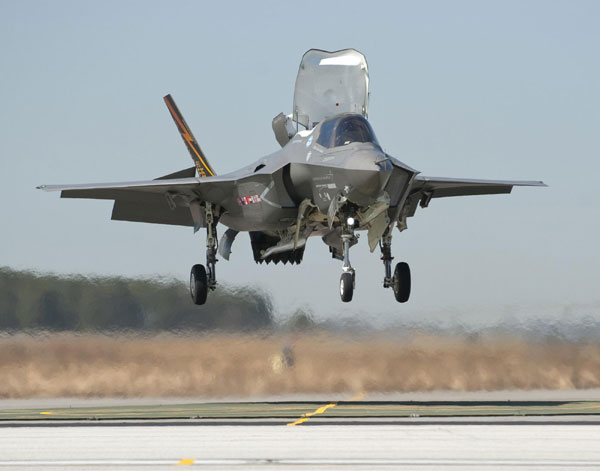Global General
Israel sticks to F-35 despite possible lag to 2018
(Agencies)
Updated: 2011-05-12 10:41
 |
Large Medium Small |

The F-35 Lightning II, also known as the Joint Strike Fighter (JSF), is shown in this March 2010 file photograph. [Photo/Agencies] |
But the Haaretz daily said Israel is unlikely to buy jets from a rival American manufacturer as a stop-gap.
Israel bought around 20 of the radar-evading Lockheed Martin Corp F-35s, along with ancillary equipment, for $2.75 billion last year, saying delivery would start in 2016 or 2017. Scheduling and budget glitches may have postponed that by a year, Haaretz said. It quoted Ehud Shani, director-general of Israel's Defence Ministry, as playing down the hold-up.
"I am not nervous about it," Shani said, adding that he saw a boon for Israel's bid to incorporate products from its own electronic warfare, communications and other high-tech systems in the F-35, which is also known as the Joint Strike Fighter.
"This may actually serve our interests. I favour an aircraft with as many Israeli-made systems as possible," he said.
U.S. officials had generally opposed the proposed changes as overly costly and potentially counter-productive.
"In the original timetable, it was argued that there was no time" to incorporate such systems into the Israeli F-35s, Shani said. "We will hear their conclusions and I expect a dialogue with the Americans over the new timetable and the changes."
Israel's current warplanes are mainly Lockheed F-16s and F-15s produced by Boeing, another US manufacturer.
Boeing had lobbied Israel to buy more F-15s but Shani dismissed as "not relevant" the possibility that such jets would stand in for the lagging F-35s.
Haaretz said the Jewish state expected a faster pace of delivery once the first F-35s arrived, and could eventually order up to 10 more of them. Israel was the first F-35 buyer outside the aircraft's co-development group comprising the United States, Britain, Italy, the Netherlands, Turkey, Canada, Australia, Denmark and Norway. The partners have been projected to buy about 730 jets.
| 分享按钮 |